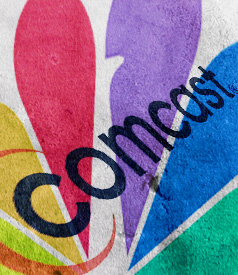The Federal Communications Commission (FCC) approved a conditions-based merger between Comcast and NBC on Tuesday. After months of heated debate over the potential consequences to net neutrality, a 4-to-1 vote by the FCC sealed Comcast’s acquisition of NBC. The Department of Justice (DOJ) also announced its approval of the deal.
Now, with 51 percent of the stake in NBC Universal (NBCU), Comcast will own the majority of the network’s channels, including CNBC and Bravo, as well as the Universal Pictures movie studio.
Comcast will also be able to maintain partial ownership of Hulu.com, but must “relinquish its managerial rights,” according to a DOJ press release. “Without such remedy, Comcast could, through its seats on Hulu’s board of directors, interfere with the management of Hulu, and, in particular, the development of products that compete with Comcast’s video service. Comcast also must continue to make NBCU content available to Hulu that is comparable to the programming Hulu obtains from Disney and News Corp.”
FCC Chairman Julius Genachowski included several provisions in the commission’s approval statement to note the importance of net neutrality as the country’s biggest cable company takes control of a large broadcast network.
“As part of the merger, Comcast-NBCU will be required to take affirmative steps to foster competition in the video marketplace,” the FCC approval letter read. “In addition, Comcast-NBCU will increase news coverage to viewers; expand children’s programming; enhance the diversity of programming available to Spanish-speaking viewers; offer broadband services to low-income Americans are reduced monthly prices; and provide high-speed broadband to schools, libraries and underserved communities, among other public benefits.”
Comcast will also have to abide by the FCC’s recently-approved net neutrality regulations, even if Congress repeals it, and must offer customers the option of ordering Internet service separately from a cable bundle – but only for the next seven years.
The restrictions enforce Comcast in providing content to some online distributors, but not all. Comcast will be able to continue withholding its content from some competitors, like Google TV.
Democratic Commissioner Michael Copps opposed the vote. The deal “reaches into virtually every corner of our media and digital landscapes and will affect every citizen in the land,” Copps said in a statement. “It confers too much power in one company’s hands.”
Sen. Al Franken (D-Minnesota), a longtime critic of the merger for over a year, called the deal a “tremendous disappointment.”
“What we see today is an effort by the FCC to appease the very companies it’s charged with regulating,” Franken stated. “With approval of this merger, the FCC has given a single media conglomerate unprecedented control over the flow of information in America.” Franken, who previously worked for NBC on “Saturday Night Live,” said last February at a Judiciary Committee hearing that his experience with the network led him to distrust promises that the two media companies had made.
Assistant Attorney General Christine Varney, who leads the DOJ antitrust division, voiced her support of the merger as part of an “open and fair marketplace.”
“The Antitrust Division conducted a thorough investigation of the Comcast and NBC Universal joint venture to examine the competitive effects of the transaction,” Varney said in a statement.
Josh Silver, president of media watchdog group Free Press, disagreed that the merger will help maintain a public and competitive market. “This deal will give Comcast unprecedented control over both media content and the physical network that delivers it,” Silver stated. “While the FCC has adopted conditions, they are insufficient short-term or voluntary fixes that will fail to prevent permanent harm to competition, consumer choice and the future of the Internet.”
In April 2010, an appeals court cast doubt on the FCC’s ability to regulate the Internet, rejecting the commission’s 2008 cease-and-desist case against Comcast, which had been accused of slowing and eventually prohibiting BitTorrent transfers.
Sen. Bernie Sanders (I-Vermont), who called for the end of the merger after Keith Olbermann’s suspension last year, said the FCC and the DOJ “ignored their mandates to protect the public interest and preserve competition” by approving the deal. “At a time when a small number of giant media corporations already control what the American people see, hear, and read, we do not need another conglomerate with more control over the production and distribution of news and other programming.”
The American Cable Association filed a study with the FCC in December estimating that the merger would cost consumers $2.4 billion over a nine-year period, due to higher monthly cable bills and subscription costs. Comcast rejected the study on the grounds that it was a “flawed analysis” that relied on unsupported calculations.
Join us in defending the truth before it’s too late
The future of independent journalism is uncertain, and the consequences of losing it are too grave to ignore. To ensure Truthout remains safe, strong, and free, we need to raise $50,000 in the next 10 days. Every dollar raised goes directly toward the costs of producing news you can trust.
Please give what you can — because by supporting us with a tax-deductible donation, you’re not just preserving a source of news, you’re helping to safeguard what’s left of our democracy.
